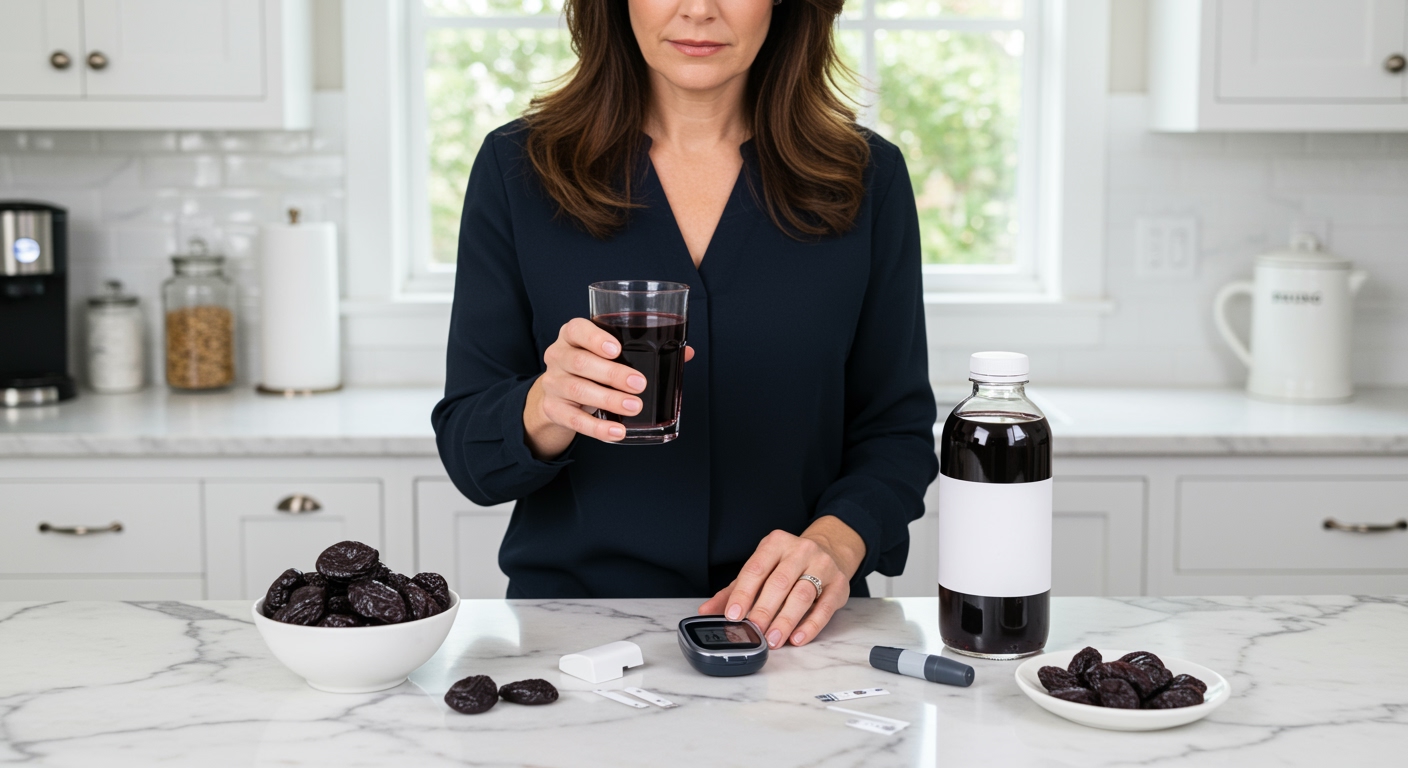✪ Key Takeaway: Prune juice can spike blood sugar due to its high natural sugar content and should be consumed sparingly by diabetics.
Introduction
You reach for that bottle of prune juice thinking you are making a healthy choice for your digestive system.
But if you have diabetes, you might wonder whether this sweet-tasting drink will send your blood sugar levels through the roof.
Hi, I am Abdur, your nutrition coach and today I am going to explain exactly how prune juice affects your blood sugar and whether it belongs in your diabetes management plan.
What Makes Prune Juice A Blood Sugar Concern?
Prune juice contains approximately 42 grams of sugar per cup, which is nearly equivalent to drinking a can of soda.
This high sugar content comes naturally from the concentrated fructose and glucose found in dried plums.
When you drink prune juice, your body absorbs these sugars quickly because the fiber has been removed during the juicing process.
The glycemic index of prune juice ranges between 43 to 55, placing it in the moderate category for blood sugar impact.
However, the glycemic load tells a different story because of the large serving sizes people typically consume.
One cup of prune juice delivers a glycemic load of 15, which can cause significant blood sugar spikes in people with diabetes.
✪ Fact: Prune juice contains more sugar per serving than many sodas and fruit drinks combined.
How Does Your Body Process Prune Juice?
When you drink prune juice, your digestive system processes it much faster than whole prunes because liquid sugars enter your bloodstream rapidly.
Your pancreas responds by releasing insulin to help cells absorb the sudden influx of glucose from your blood.
People with type 1 diabetes cannot produce enough insulin naturally, while those with type 2 diabetes may have insulin resistance that prevents proper glucose uptake.
This means prune juice can cause prolonged elevated blood sugar levels in both types of diabetes.
The absence of fiber in prune juice also means you miss the blood sugar buffering effect that whole prunes provide.
Fiber normally slows down sugar absorption and helps maintain more stable glucose levels throughout the day.
✪ Pro Tip: Always test your blood sugar 2 hours after drinking prune juice to understand your personal response.
Are There Any Benefits For Diabetics?
Prune juice does contain some beneficial nutrients that might support overall health in people with diabetes.
It provides potassium, which helps regulate blood pressure, and antioxidants that may reduce inflammation associated with diabetes complications.
The drink also contains small amounts of vitamin K and iron, which support bone health and oxygen transport respectively.
However, these benefits come with a significant trade-off in terms of blood sugar control.
Many diabetics drink prune juice for its digestive benefits, particularly for relieving constipation.
While it can be effective for this purpose, the blood sugar impact often outweighs the digestive benefits for most people with diabetes.
✪ Note: The nutrients in prune juice can be obtained from other foods with less impact on blood sugar.
What Are Better Alternatives?
Instead of prune juice, consider eating whole prunes in small portions to get digestive benefits with better blood sugar control.
Two to three whole prunes contain about 12 grams of sugar compared to 42 grams in a cup of juice.
The fiber in whole prunes slows sugar absorption and provides the same digestive benefits you are seeking.
For digestive health, you might also try sugar-free alternatives like psyllium husk, ground flaxseeds, or chia seeds mixed with water.
These options provide excellent fiber without the blood sugar impact of concentrated fruit sugars.
If you must drink prune juice occasionally, limit yourself to 2-4 ounces and pair it with protein or healthy fats to slow sugar absorption.
✪ Pro Tip: Dilute small amounts of prune juice with water to reduce sugar concentration while maintaining some flavor.
The Bottom Line
Prune juice is not the best choice for people with diabetes due to its high sugar content and rapid absorption rate.
Your blood sugar deserves better than a quick fix that creates bigger problems down the road.
I would love to hear about your experiences with prune juice and blood sugar management, so please share your thoughts or questions in the comments below.
References
At NutritionCrown, we use quality and credible sources to ensure our content is accurate and trustworthy. Below are the sources referenced in creating this article:
- SugarFit: Is Prunes Good for Diabetes
- January AI: Prune Juice Glycemic Index
- Use Nourish: Prunes and Diabetes
- Klinio: Prunes and Diabetes Hub





